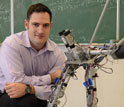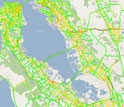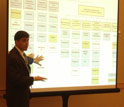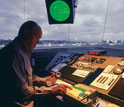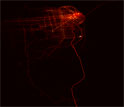News Release 13-079
National Science Foundation Announces Projects to Expand the Frontiers of Cyber-Physical Systems
Broad, multi-institution, multi-disciplinary research will advance national priorities such as health, energy and transportation

CPS examples include cruise control, auto-pilot and highway, water and air traffic control systems
May 3, 2013
This material is available primarily for archival purposes. Telephone numbers or other contact information may be out of date; please see current contact information at media contacts.
The National Science Foundation (NSF) today announced two grants totaling $13 million to support multi-university projects in Cyber-Physical Systems (CPS). These projects are key components of NSF's CPS technologies portfolio, for which investments exceeded $150 million during the last four years.
CPS technologies employ sensors, processors and actuators to enable computers to perform dynamically in the physical world, providing people with useful real-time information. They are used in cruise control mechanisms in passenger cars, auto-pilot systems in aircraft, control mechanisms in prosthetics, and futuristic robotic devices for search and rescue.
CPSs also are core to the functioning of medical devices, energy-efficient structures, advanced manufacturing and modern agriculture.
"This investment in fundamental advances at the intersection of cyber and physical systems will pay huge dividends for our nation," said Farnam Jahanian, NSF's assistant director for Computer and Information Science and Engineering (CISE). "Advances in CPS hold the potential to reshape our world with more responsive, precise and efficient systems that augment human capabilities, work in dangerous or inaccessible environments, provide large-scale, distributed coordination and enhance societal well-being."
During the last four years, the CPS program has supported research from a number of perspectives with funding from both CISE and NSF's Directorate for Engineering.
What follows are descriptions of the two large awards announced today.
Foundations of Resilient Cyber-Physical Systems (FORCES) - University of California, Berkeley (UC Berkeley); Massachusetts Institute of Technology (MIT); Vanderbilt University and the University of Michigan (U-M).
This five-year, $9-million project will test different theories to determine the most efficient approach to designing and operating CPS. These efforts will be coupled with a rigorous economic approach to provide new tools for CPS designers and operators to make complex, interconnected networks more resilient in the face of unexpected disruptions, such as those caused by natural disasters or adversaries. For example, FORCES will explore applications in transportation through the evaluation of economic incentives that encourage good driving behavior. It will also explore applications in energy through electric power generation and distribution in response to real-time consumer demand.
The project, headed by S. Shankar Sastry, dean of the College of Engineering at UC Berkeley, is a collaboration among researchers at UC Berkeley (Dawn Song, Claire Tomlin, Alexandre Bayen and Galina Schwartz); MIT (Saurabh Amin, Hamsa Balakrishnan and Asuman Ozdaglar); Vanderbilt University (Xenofon Koutsoukos, Gabor Karsai and Janos Sztipanovits); and U-M (Demosthenis Teneketzis and Ian Hiskens).
"We are excited about the opportunity to make an impact in an area so vital to the nation's security and economic prosperity," said Sastry. "Integrating economic analysis with resilient control for cyber-physical systems is a pioneering approach that promises to greatly improve CPS performance for society at large."
"Even a marginal improvement in the design of these man-made technological systems could translate into a tremendous boon for the economy," said Teneketzis, electrical engineering and computer science professor at U-M. "We're talking about billions of dollars."
It is expected that the findings of this project will be useful to federal, state and local agencies that regulate each type of CPS.
Correct-by-Design Control Software Synthesis for Highly Dynamic Systems - University of Michigan (U-M), University of California, Los Angeles (UCLA), Texas A&M University (TAMU) and Carnegie Mellon University (CMU).
The aim of this four-year, $4-million project is to streamline the production of CPS by developing sophisticated methods for synthesizing control software for engineered systems. The objective is to make it easier to design next-generation CPS so that minimal adjustment will be required during subsequent development and implementation processes. This work will have broad applications to many existing systems, including automobiles, prostheses and manufacturing.
"Our work is concerned with control theoretic methods that will allow advanced techniques from computer science to work on real-world systems where fast reactions are absolutely crucial," said Jessy Grizzle, professor of engineering at U-M and lead investigator on the collaboration.
"In the end, the most important aspect is safety," Grizzle continued. "These software systems are going on cars that are automatically making steering and braking decisions for you or on robots that will be traipsing around rubble, and we need to have super high confidence in the correctness of the software that is operating them. This work aims to increase the likelihood that the software will do what it's supposed to do, and safely."
Grizzle's U-M team will include engineering professors Huei Peng and Necmiye Ozay (to join the U-M faculty in the fall) and will collaborate with Detroit-area auto companies as well as UCLA (Paulo Tabuada), TAMU (Aaron Ames), and CMU (Hartmut Geyer).
-NSF-
-
AMBER Lab Head Aaron Ames pictured with two-legged, humanlike robot that can walk among us.
Credit and Larger Version -
Berkeley's Mobile Millennium visualization system uses data to broadcast traffic information.
Credit and Larger Version -
UC Berkeley's Alexandre Bayen presents concepts to reduce traffic congestion explored in FORCES.
Credit and Larger Version -
Air, water and land transportation systems rely on CPS techology to effectively function today.
Credit and Larger Version -
GPS Tracks of all San Francisco taxis collected from the Mobile Millennium system over a few hours.
Credit and Larger Version
Media Contacts
Denise Brehm, MIT, (617) 253.8069, email: brehm@mit.edu
Lisa-Joy Zgorski, NSF, (703) 292-8311, email: lisajoy@nsf.gov
Kap Stann, Berkeley, (510) 643-6898, email: kstann@berkeley.edu
Bill Kisliuk, UCLA, (310) 206-0540, email: bkisliuk@support.ucla.edu
Byron Spice, Carnegie Mellon, (412) 268-9068, email: bspice@cs.cmu.edu
Lesley V. Kriewald, Texas A&M, (979) 845-5524, email: lesleyk@tamu.edu
Nicole Casal Moore, U Michigan, (734) 647-7087, email: ncmoore@umich.edu
Christopher Rowe, Vanderbilt, (615) 322-3479, email: chris.rowe@vanderbilt.edu
Program Contacts
Helen Gill, NSF, (703) 292-7834, email: hgill@nsf.gov
David Corman, NSF, (703) 292-8950, email: dcorman@nsf.gov
Erwin Gianchandani, NSF, (703) 292-8950, email: egiancha@nsf.gov
Principal Investigators
Shankar Sastry, Berkeley, email: sastry@eecs.berkeley.edu
Jessy W. Grizzle, U Michigan, (734)-763-3598, email: grizzle@umich.edu
Co-Investigators
Saurabh Amin, MIT, email: amins@MIT.EDU
Aaron Ames, Texas A&M, email: aames@tamu.edu
Paulo Tabuada, UCLA, email: tabuada@ee.ucla.edu
Hartmut Geyer, Carnegie Mellon, email: hgeyer@cs.cmu.edu
Demosthenis Teneketzis, U Michigan, email: teneket@umich.edu
Xenofon Koutsoukos, Vanderbilt, email: xenofon.koutsoukos@vanderbilt.edu
Related Websites
NSF Cyber-physical Systems: http://www.nsf.gov/funding/pgm_summ.jsp?pims_id=503286
The U.S. National Science Foundation propels the nation forward by advancing fundamental research in all fields of science and engineering. NSF supports research and people by providing facilities, instruments and funding to support their ingenuity and sustain the U.S. as a global leader in research and innovation. With a fiscal year 2023 budget of $9.5 billion, NSF funds reach all 50 states through grants to nearly 2,000 colleges, universities and institutions. Each year, NSF receives more than 40,000 competitive proposals and makes about 11,000 new awards. Those awards include support for cooperative research with industry, Arctic and Antarctic research and operations, and U.S. participation in international scientific efforts.
Connect with us online
NSF website: nsf.gov
NSF News: nsf.gov/news
For News Media: nsf.gov/news/newsroom
Statistics: nsf.gov/statistics/
Awards database: nsf.gov/awardsearch/
Follow us on social
Twitter: twitter.com/NSF
Facebook: facebook.com/US.NSF
Instagram: instagram.com/nsfgov



